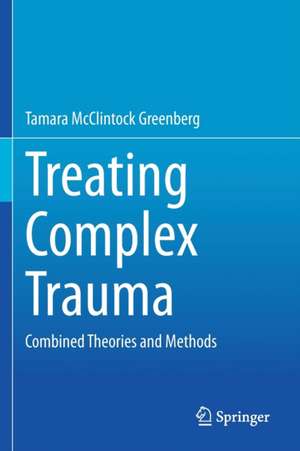Treating Complex Trauma: Combined Theories and Methods
Autor Tamara McClintock Greenbergen Limba Engleză Paperback – 5 aug 2021
This forward-thinking volume outlines several approaches to therapeutic treatment for individuals who have experienced complex childhood and adult trauma, providing a novel framework for helping patients with a number of challenging symptoms, with clinical hypothesis testing and solid therapeutic relationships as a vital foundation. Responding to the intense disagreement and competition among clinicians championing their own approaches, the book identifies the strengths and limitations of multiple therapeutic approaches, addressing the need for qualified clinicians to be versed in multiple theories and techniques in order to alleviate suffering in their clients.
Among the topics discussed:
Among the topics discussed:
- How to choose specific therapeutic methods and when to shift techniques
- The neurobiology of trauma and management of fear
- Cultural and ethnic considerations in trauma treatment
- Addressing avoidance and creating a safe therapeutic environment
- Management of dissociation, substance abuse, and anger
"For the first time in the professional literature we are finally afforded a clear, cogent, and detailed explication of complex trauma and the multifaceted parameters of treatment. Dr. Tamara McClintock Greenberg provides perspicacious insight and clinical wisdom only a seasoned career therapist can yield. Offering sophisticated and nuanced distinctions between complex trauma and PTSD, she shows how treatment is necessarily contextual and tailored to the unique clinical and personality dynamics of the sufferer that is thoroughly client specific within the therapeutic dyad. She dispenses with simplistic and supercilious attitudes that embarrassingly boast a uniform or manualized treatment to trauma, instead carefully taking into consideration polysymptomatic, neurobiological, and socialcultural differences that inform the interpersonal, emotional, and safety milieu from the beginning of treatment to stabilization, the working-through process, and then onto successful recovery. This is a must-read book for those in training and senior clinicians alike."
--Jon Mills, PsyD, PhD, ABPP, Faculty, Postgraduate Programs in Psychoanalysis & Psychotherapy, Adelphi University, NY; author of Treating Attachment Pathology
"Dr. Greenberg has written an invaluable book on treating complex trauma. She delves into multiple approaches, assessing what techniques the client can tolerate at a given therapeutic stage. She covers how to maintain consistency and connection through a flexible approach and avoid pitfalls. This is a must read for clinicians wishing to treat clients with complex PTSD."
--Louann Brizendine, MD, Clinical Professor UCSF; author of The Female Brain
| Toate formatele și edițiile | Preț | Express |
|---|---|---|
| Paperback (1) | 524.36 lei 6-8 săpt. | |
| Springer International Publishing – 5 aug 2021 | 524.36 lei 6-8 săpt. | |
| Hardback (1) | 699.93 lei 6-8 săpt. | |
| Springer International Publishing – 4 aug 2020 | 699.93 lei 6-8 săpt. |
Preț: 524.36 lei
Preț vechi: 616.90 lei
-15% Nou
Puncte Express: 787
Preț estimativ în valută:
100.35€ • 108.96$ • 84.29£
100.35€ • 108.96$ • 84.29£
Carte tipărită la comandă
Livrare economică 23 aprilie-07 mai
Preluare comenzi: 021 569.72.76
Specificații
ISBN-13: 9783030452872
ISBN-10: 3030452875
Pagini: 215
Ilustrații: XIV, 215 p. 8 illus., 3 illus. in color.
Dimensiuni: 155 x 235 mm
Greutate: 0.33 kg
Ediția:1st ed. 2020
Editura: Springer International Publishing
Colecția Springer
Locul publicării:Cham, Switzerland
ISBN-10: 3030452875
Pagini: 215
Ilustrații: XIV, 215 p. 8 illus., 3 illus. in color.
Dimensiuni: 155 x 235 mm
Greutate: 0.33 kg
Ediția:1st ed. 2020
Editura: Springer International Publishing
Colecția Springer
Locul publicării:Cham, Switzerland
Cuprins
Chapter One: The Need for Utilizing Multiple Approaches for Complex PTSD: No Theory Has It All.- Chapter Two: How Trauma Stokes Fear: Considerations in Beginning of Therapy.- Chapter Three: Nurturing the Therapeutic Alliance: Mentalizing and Emotional Safety.- Chapter Four: The Therapeutic Alliance and Maintaining Physical Safety.- Chapter Five: Dissociation: Controversies and Clinical Strategies.- Chapter Six: The Need to Numb: Substance Abuse and Therapeutic Management.- Chapter Seven: When Trauma is in the Body: Managing Physical Concerns.- Chapter Eight: When Fight Impulses Dominate: Managing Anger.- Chapter Nine: Sociocultural Consideration in Trauma Treatment.- Chapter Ten: Vicarious Trauma and Self Care for the Trauma Therapist.
Recenzii
“The merits of this book are many, the most important being to make a serious and pervasive disorder such as complex trauma more understandable and therefore more treatable, providing clinicians with a wide framework of concepts and therapeutic tools, and a sustained example of how to build one’s own personal toolbox for these often difficult, long and challenging psychotherapies.” (Monica Luci, Psychoanalytic Psychotherapy, May 28, 2021)
Notă biografică
Tamara McClintock Greenberg, Psy.D., M.S., is a clinical psychologist in private practice in San Francisco, CA, where she specializes in treating adults with depression, anxiety, relationship issues, trauma, and those who are coping with medical illness, either as a patient or affected family member. She has been practicing psychology in San Francisco since 1997.
As a Full Clinical Professor of Psychiatry at the University of California, San Francisco, Tamara spent over 12 years seeing medical patients and their families in the UCSF hospitals and clinics and has spent the last 22 years supervising psychiatry residents, psychology interns and students in a number of different training centers.
Tamara received a post-doctorate master’s degree in Clinical Psychopharmacology from Alliant University/California School of Professional Psychology in 2004, her Doctorate Degree in Clinical Psychology from Argosy University/Minnesota School of Professional Psychology, Minneapolis, MN in 1997.
She received the Jacob Markovitz Memorial Scholarship toward her graduate school studies. Her APA-approved predoctoral internship was at the Veterans Affairs Medical Center in North Chicago, IL from 1996-1997. She has been licensed as a clinical psychologist in the state of California since 1999 (PSY 16206). Her publishing has focused on care taking, health psychology, psychodynamic psychology, women’s issues and trauma, with the aim of helping people navigate complex physical and/or psychological issues.
Tamara has written for multiple publications, including The Huffington Post, Psych Central, Psychology Today, The Good Men Project, Maria Shriver’s website, The San Francisco Chronicle, and has been quoted as an expert in Forbes, USA Today, Newsweek, Next Avenue (PBS), The Washington Post and more. She has been interviewed by numerous radio stations, including several NPR stations and affiliates.
Tamara lives in San Francisco with her husband and two pugs, Roscoe and Rufus.
As a Full Clinical Professor of Psychiatry at the University of California, San Francisco, Tamara spent over 12 years seeing medical patients and their families in the UCSF hospitals and clinics and has spent the last 22 years supervising psychiatry residents, psychology interns and students in a number of different training centers.
Tamara received a post-doctorate master’s degree in Clinical Psychopharmacology from Alliant University/California School of Professional Psychology in 2004, her Doctorate Degree in Clinical Psychology from Argosy University/Minnesota School of Professional Psychology, Minneapolis, MN in 1997.
She received the Jacob Markovitz Memorial Scholarship toward her graduate school studies. Her APA-approved predoctoral internship was at the Veterans Affairs Medical Center in North Chicago, IL from 1996-1997. She has been licensed as a clinical psychologist in the state of California since 1999 (PSY 16206). Her publishing has focused on care taking, health psychology, psychodynamic psychology, women’s issues and trauma, with the aim of helping people navigate complex physical and/or psychological issues.
Tamara has written for multiple publications, including The Huffington Post, Psych Central, Psychology Today, The Good Men Project, Maria Shriver’s website, The San Francisco Chronicle, and has been quoted as an expert in Forbes, USA Today, Newsweek, Next Avenue (PBS), The Washington Post and more. She has been interviewed by numerous radio stations, including several NPR stations and affiliates.
Tamara lives in San Francisco with her husband and two pugs, Roscoe and Rufus.
Textul de pe ultima copertă
This forward-thinking volume outlines several approaches to therapeutic treatment for individuals who have experienced complex childhood and adult trauma, providing a framework for helping challenging patients and emphasizing the importance of maintaining good therapeutic relationships. Responding to the intense disagreement and competition among clinicians championing their own approaches, the book identifies the strengths and limitations of multiple theories of treatment, addressing the need for qualified clinicians to be versed in multiple theories and techniques in order to best benefit their patients.
Among the topics discussed:
"Dr. Tamara McClintock Greenberg provides perspicacious insight and clinical wisdom only a seasoned career therapist can yield. Offering sophisticated and nuanced distinctions between complex trauma and PTSD, she shows how treatment is necessarily contextual and tailored to the unique clinical and personality dynamics of the sufferer that is thoroughly client specific within the therapeutic dyad."
--Jon Mills, PsyD, PhD, ABPP, Faculty, Postgraduate Programs in Psychoanalysis & Psychotherapy, Adelphi University, NY; author of Treating Attachment Pathology
"Dr. Greenberg has written an invaluable book on treating complex trauma. She delves into multiple approaches, assessing what techniques the client can tolerate at a given therapeutic stage. She covers how to maintain consistency and connection through a flexible approach and avoid pitfalls. This is a must read for clinicians wishing to treat clients with complex PTSD."
--Louann Brizendine, MD, Clinical Professor UCSF; author of The Female Brain
Among the topics discussed:
- Difficulties in diagnosing cPTSD among other similarly presenting disorders
- Cultural and ethnic considerations in trauma treatment
- Addressing avoidance when talking to patients
- Maintaining the therapeutic relationship with aggressive patients
"Dr. Tamara McClintock Greenberg provides perspicacious insight and clinical wisdom only a seasoned career therapist can yield. Offering sophisticated and nuanced distinctions between complex trauma and PTSD, she shows how treatment is necessarily contextual and tailored to the unique clinical and personality dynamics of the sufferer that is thoroughly client specific within the therapeutic dyad."
--Jon Mills, PsyD, PhD, ABPP, Faculty, Postgraduate Programs in Psychoanalysis & Psychotherapy, Adelphi University, NY; author of Treating Attachment Pathology
"Dr. Greenberg has written an invaluable book on treating complex trauma. She delves into multiple approaches, assessing what techniques the client can tolerate at a given therapeutic stage. She covers how to maintain consistency and connection through a flexible approach and avoid pitfalls. This is a must read for clinicians wishing to treat clients with complex PTSD."
--Louann Brizendine, MD, Clinical Professor UCSF; author of The Female Brain
Caracteristici
Evaluates a range of clinical approaches and techniques for treating complex trauma Outlines common symptoms of complex childhood and adulthood trauma Provides a framework for clinicians to treat extremely challenging patients Emphasizes the importance of a stable therapist-patient relationship




